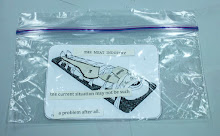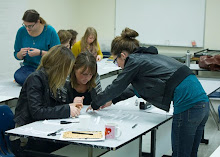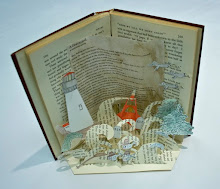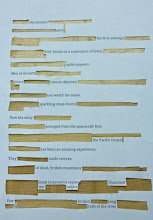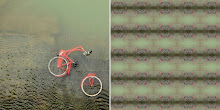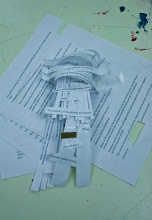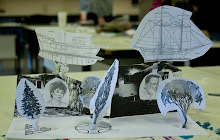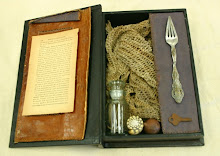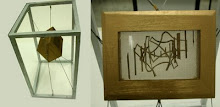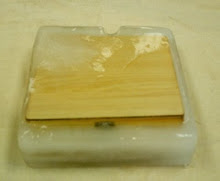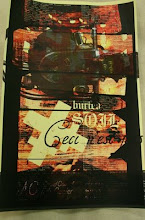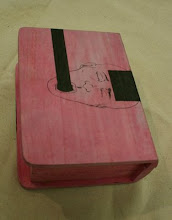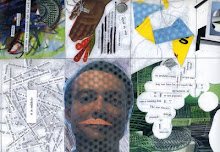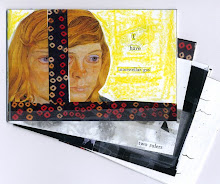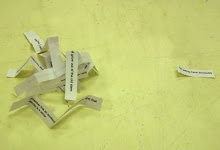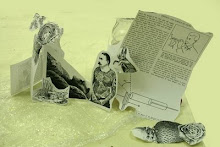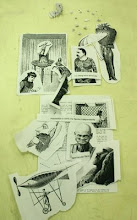VVP: Art 434 & Engl. 410
- Dan Callis and Chris Davidson
- Website for Vision Voice and Practice: An Interdisciplinary Course in Art and Creative Writing
Monday, April 30, 2012
Tuesday, April 24, 2012
Spot Collaboration: Writing
Students were broken into groups of three and given a line of text, either from Frank O'Hara or Dietrich Bonhoeffer. (Yes.) The students then had to add three lines to that line to make some sort of poem-like thing. When finished, the groups had to switch poems with each other and perform three "actions" on the poem they now had before them. This could mean adding lines, striking words, changing syntax, etc. After finishing these actions, the groups switched poems again and then performed three actions on the newly modified poems. Then each group read the product they had in their possession. Below are the results.
~
Cars are as I AM--
waiting.
And even the traffic halts
So thick is existence.
The looming sound of the passing train disrupts my thoughts
As the sun peers around the sky scraper.
Time is raging on.
~
I don't play this game very well.
I've no sympathy with attempts.
Distress creates problems too big to be solved by pleasantries.
So instead, I won't explain away distress.
~
I hope you have a chance to see
the city again.
It is a shame--
it must be damn tranquil. So
I wish you back soon.
With my illness I am unable
to see you again.
~
Even the stabbings are causing the population explosion. I have been irreversibly wakened from slumber. I cannot fathom the beauty of my destruction, which is not destruction but a dream of blue turtles.
~
I take in
I can listen
But add nothing
I find nothing to say
In this place
Wind whistles
And that's it
~
And the park's full of dancers
with their tights and shoes
hanging from trees, darkened fruits.
The air holds lifeless birds.
The End
~
Cars are as I AM--
waiting.
And even the traffic halts
So thick is existence.
The looming sound of the passing train disrupts my thoughts
As the sun peers around the sky scraper.
Time is raging on.
~
I don't play this game very well.
I've no sympathy with attempts.
Distress creates problems too big to be solved by pleasantries.
So instead, I won't explain away distress.
~
I hope you have a chance to see
the city again.
It is a shame--
it must be damn tranquil. So
I wish you back soon.
With my illness I am unable
to see you again.
~
Even the stabbings are causing the population explosion. I have been irreversibly wakened from slumber. I cannot fathom the beauty of my destruction, which is not destruction but a dream of blue turtles.
~
I take in
I can listen
But add nothing
I find nothing to say
In this place
Wind whistles
And that's it
~
And the park's full of dancers
with their tights and shoes
hanging from trees, darkened fruits.
The air holds lifeless birds.
The End
Monday, April 23, 2012
Individual Projects: Writing
Every Seven Years
I'm gonna to go down to the river. It's a long walk and I've got to start now. I'm gonna muster my weary soul and make my feet take me there. The river's gonna be running in full flush now, as heavy and swollen as a woman with a child in her belly. The woods are gonna be green. Green and buzzing with all manner of life. This time of year, you can sit and see the trees reaching higher and higher for the sky. I'm taking all the books with me. I've got 'em packed all in a case. I'm gonna set 'em free. Gonna take 'em down to the river.
Gonna spread 'em out on the riverbank. They're gonna open themselves up to the air, to the waves, to the sand, to the light. Books got to be aired out every now and then. The good in 'em gets stale, else. I'm gonna open 'em up and then wade out in the river. I might lie down. Might try to get clean. Might try to get right with God. All those books I've read. Let the current take the words right out of me. Let the sun bleach the pages blank and clean. Gonna spread 'em out on the riverbank.
They tried to keep 'em hidden, tried to keep 'em dark. But I found 'em. I found 'em in that old house I live in now. They were packed away up in the attic and away down in the cellar. The boxes weren't even marked right. But I went up the stairs, searching for clean air, and I found the books. I went down the stairs, searching for some quiet, dark place, and I found the books. I brought 'em out. I cared for 'em. I healed their hurts and mended their broken backs. And now it's my turn. Those pages, my how they will flutter and fly. That ink's gonna run a trail of tears into the river. They tried to keep 'em hidden, tried to keep 'em dark.
That water's getting stained with all those things. The ink's running out of the books now. Each book a river. Each book adding to the river. The ink's running out of my skin now. I'm stained inside. Those books, they get into your blood. They get under your skin. They turn into your hair and eyelashes and the bits of your fingernails that you bite off and spit out. They say your body gets made new every once in a while. I don't know. I'm gonna keep on putting books in the river. I'm not trying to hide 'em, just making things free. That water's getting stained with all those things.
That water's getting stained with all those things. The ink's running out of the books now. Each book a river. Each book adding to the river. The ink's running out of my skin now. I'm stained inside. Those books, they get into your blood. They get under your skin. They turn into your hair and eyelashes and the bits of your fingernails that you bite off and spit out. They say your body gets made new every once in a while. I don't know. I'm gonna keep on putting books in the river. I'm not trying to hide 'em, just making things free. That water's getting stained with all those things.
- Jayne Meyncke
Saturday, April 14, 2012
The New Aesthetic and Its Discontents
The past few weeks I have encountered several posts online pertaining to something called "The New Aesthetic," hastened by a panel discussion on said phenomenon at South by Southwest. (One response began, "Is the New Aesthetic a thing?") Reading over these responses, and checking out the related tumblr, got me thinking about this class. I'm most interested in this essay, which seems to speak to the moment in its larger context. Is there a connection to what we're doing here? What do you think?
Saturday, April 7, 2012
Paying Attention and Meaning
A couple weeks ago, we read an essay by Charles Tomlinson called "The Poet as Painter," and a number of things he wrote seemed relevant to this class, such as this:
Cezanne himself was very conscious of [a] problem problem for the painter--how to reconcile sensation and form without bullying your picture into a wilful unity, a triumph of personality at the expense of a truth to relationship.
But how to do this? I think the main way is by paying attention, to listening and looking:
I think, once more, of Wallace Stevens, and that entry in his Adagia which reads: 'The aspects of earth of interest to a poet are the casual ones, as light or colour, images.' By 'casual', I take it that he refers to the fortuitous nature of art--the way one may find its deepest meanings on a dull street corner, in an old pair of shoes, in the chance conjunction of the totally unforeseen and apparently unrelated. Suddenly things knit up--the canvas joins hands, in Cezanne's words. You cease to impose and you discover, to rephrase another aphorism of Stevens. And you discover apparently by chance. But what is chance? And if one accepts it, does it not cease to be chance?
Which brings me to Elizabeth Bishop. The students have been looking at Frank O'Hara's poems, which certainly exist in the fortuitousness Tomlinson talks about, especially as O'Hara moves through the city, picking up and putting into his poems snatches of conversation, proper names, and sensory perceptions that come flitting into his ever-roaming mind. This past Thursday, before we discussed O'Hara's poems, I read the following passage by Bishop, on the poet's "material":
i.e., immediate, intense physical reactions, a sense of metaphor and decoration in everything--to express something not of them--something I suppose spiritual. But it proceeds from the material, the material eaten out with acid, pulled down from underneath, made to perform and always kept in order, in its place. Sometimes it cannot be made to indicate its spiritual goal clearly (some of Hopkins, say, where the point seems to be missing) but even then the spiritual must be felt. Miss Moore does this--but occasionally. The other way--of using the supposedly "spiritual"--the beautiful, the nostalgic, the ideal and poetic, to produce the material is the way of the Romantic, I think, and a great perversity.
(The essay I gleaned this from can be found here.) We've been discussing all semester how to listen to the material, how to let it tell you where to take it, and something about re-reading O'Hara brought the above passage to mind. After reading it, I read my favorite of Bishop's poems, "At the Fishhouses," a poem that seems to nearly perfectly illustrate this process of paying attention giving way to "meaning."
Monday, April 2, 2012
Text Image Collaborations








Working in three-person collaboration teams the students created a visual work that combined text and images in which text was to be privileged. They were to use the primary delivery structure or site of authority for text, ie, book, magazine, broadsheet, etc. as a structural consideration fort the new work.
Subscribe to:
Posts (Atom)





